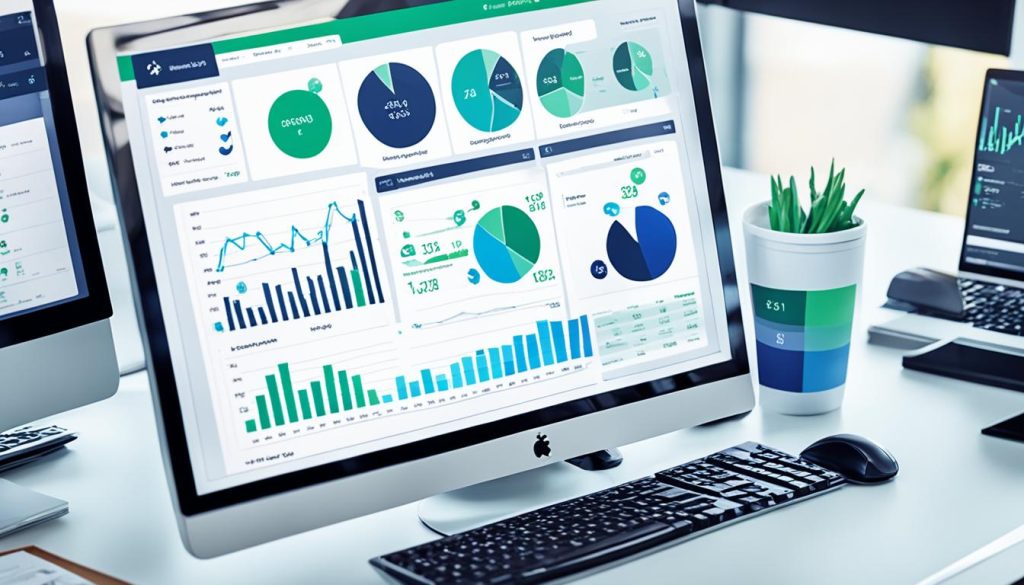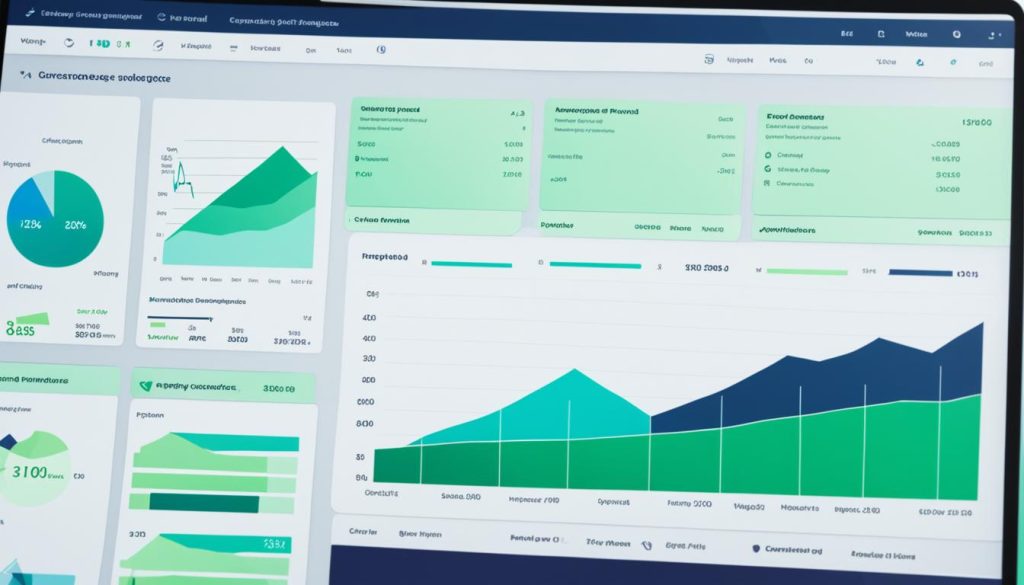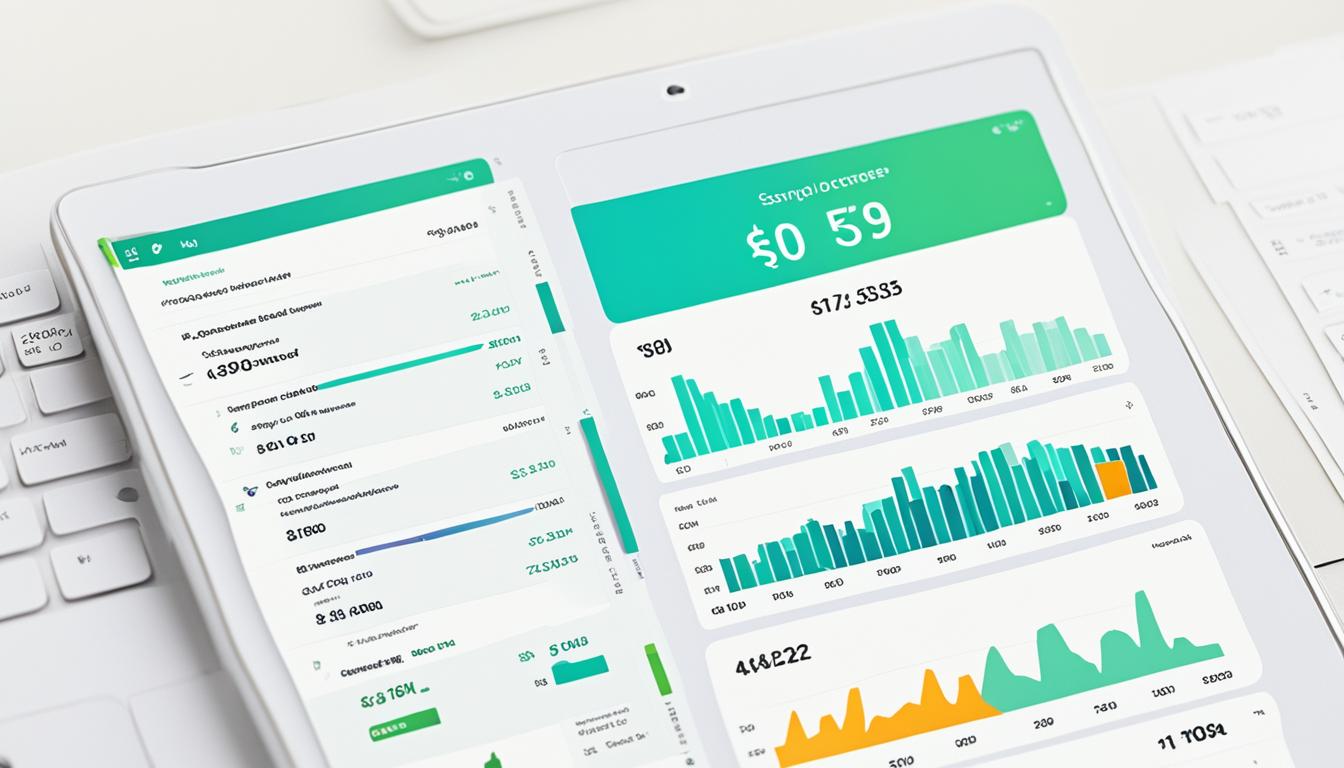Managing personal finances can sometimes feel overwhelming, especially with the numerous financial decisions we make on a daily basis. Fortunately, there are software programs available that can help individuals manage their personal finances more effectively. Whether you want to track your expenses, create budgets, plan for the future, or make informed financial decisions, personal finance software can provide the tools and functionalities you need.
When it comes to finding the best software to manage personal finances, it’s essential to evaluate different options based on your specific needs and financial goals. Consider factors such as budgeting capabilities, investment tracking features, and the ability to generate financial reports. By choosing the right software, you can take control of your finances and improve your financial well-being.
Key Takeaways:
- Personal finance software can help individuals manage their finances more effectively.
- There are different types of personal finance software available, including budgeting, investment, and accounting software.
- It’s important to consider your specific needs and financial goals when choosing personal finance software.
- Personal finance software offers features such as expense tracking, budget creation, and investment advice.
- The cost of personal finance software can vary, so it’s essential to evaluate the value it provides.
Types of Finance Software
When it comes to managing personal finances effectively, there are several types of finance software available. These software programs cater to different needs and provide various features and functionalities to help individuals track their spending, plan for the future, and make informed financial decisions.
Budgeting Software
Budgeting software is designed to assist individuals in tracking their income, expenses, and overall financial health. It helps create budgets, set financial goals, and monitor spending habits. With budgeting software, individuals can easily visualize their financial situation and make necessary adjustments to achieve their financial objectives.
Financial Planning Software
Financial planning software is essential for individuals looking to secure their financial future. It enables users to create comprehensive financial plans, track investments, analyze market trends, and develop strategies to achieve their long-term goals. This type of software provides a holistic approach to financial management and empowers individuals to make smart investment decisions.
Investment Software
Investment software simplifies the management and monitoring of investment portfolios. It helps track stock prices, analyze market trends, and provides tools for making informed investment choices. Whether you’re an experienced investor or just starting, investment software can provide valuable insights and streamline your investment process.
Tax Software
Tax software simplifies the process of preparing and filing taxes. It helps individuals maximize deductions, calculate tax obligations accurately, and submit tax returns electronically. Tax software ensures compliance with tax regulations, minimizing the risk of errors and potential audits. With its intuitive interface and thorough tax guidance, this software is invaluable during tax season.
Accounting Software
Accounting software is essential for individuals who need to manage their income, expenses, and financial records efficiently. It helps with tracking accounts receivable and payable, generating financial statements, and automating various accounting tasks. With accounting software, individuals can stay organized and gain valuable insights into their financial performance.
Each type of finance software has its own unique features and benefits. It’s important to choose the software that aligns with your specific needs and financial goals. Now that we’ve discussed the types of finance software available, in the next section, we’ll explore the differences between personal finance software and business finance software.
| Software | Main Features |
|---|---|
| Budgeting Software |
|
| Financial Planning Software |
|
| Investment Software |
|
| Tax Software |
|
| Accounting Software |
|
Personal Finance Software vs. Business Finance Software
When it comes to managing finances, both individuals and businesses have different needs and requirements. This is where the distinction between personal finance software and business finance software comes into play.
**Personal finance software** is specifically designed for individuals to keep track of their personal finances effectively. It offers a range of features that help with budgeting, investment tracking, and expense management. With personal finance software, individuals can gain a clear understanding of their spending habits, set financial goals, and make informed decisions regarding their personal finances.
On the other hand, **business finance software** is tailored to the needs of companies and organizations. In addition to budgeting and investment tracking, business finance software provides additional functionalities such as invoicing, inventory management, and financial reporting. It enables businesses to streamline their financial operations, maintain accurate records, and generate comprehensive reports for better decision-making.
Personal finance software focuses primarily on helping individuals achieve their financial goals and manage their personal budgets effectively. In contrast, business finance software caters to the specific requirements of companies, encompassing essential aspects like invoicing and inventory management.
In a nutshell:
- Personal finance software is for individuals, helping them track personal finances, manage budgets, and make informed decisions.
- Business finance software is designed for companies, providing tools for invoicing, inventory management, and financial reporting.
![]()
Best Finance Software for Businesses
When it comes to managing financial operations, businesses need reliable and efficient finance software. Several top options cater specifically to the needs of businesses, providing powerful tools and features to streamline financial management. Whether it’s budgeting, forecasting, or analysis, these software solutions are designed to enhance productivity and drive business growth.
Here are some of the best finance software options for businesses:
- Cube: Cube is a spreadsheet-native FP&A platform that empowers finance teams to analyze, plan, and collaborate effectively. With its user-friendly interface and robust features, Cube simplifies financial planning and allows businesses to make informed decisions.
- Anaplan: Anaplan is a cloud-based financial modeling and planning software that helps businesses model transactions and establish relationships between data sets. It offers advanced analytics and scenario planning capabilities, enabling businesses to optimize their financial strategies.
- Workday Adaptive Planning: Workday Adaptive Planning provides a personalized and collaborative approach to budgeting, forecasting, and reporting. With its intuitive interface and real-time data integration, businesses can make accurate financial projections and drive informed decision-making.
- Jirav: Jirav offers forecasting, reporting, and analysis tools to give businesses a clear picture of their financial health. Its intuitive dashboards and configurable reports provide valuable insights, enabling businesses to identify trends and make data-driven decisions.
- Vena Solutions: Vena Solutions is a cloud-based planning and analysis solution that brings cross-functional teams together. It provides collaborative budgeting, forecasting, and reporting capabilities, helping businesses streamline their financial processes and improve overall efficiency.
- Sage Intacct: Sage Intacct is a cloud-based accounting software that allows businesses to budget, plan, and adapt to changing conditions. With its comprehensive financial management features, businesses can automate processes, gain financial visibility, and make informed decisions.
- FreshBooks: FreshBooks is accounting software designed specifically for small businesses. It offers features like invoicing, expense tracking, and automated financial tasks, helping businesses maintain accurate financial records and streamline their accounting processes.
These finance software solutions cater to the diverse needs of businesses, providing them with the tools and capabilities required to effectively manage their finances. Whether it’s analyzing financial data, creating budgets, or generating reports, these software options offer the scalability and functionality necessary for sustainable growth.

Best Personal Finance Software
When it comes to managing your personal finances, having the right software can make all the difference. Here, we’ve rounded up some of the best personal finance software options to help you take control of your money. Whether you need help with budgeting, tracking debts, or managing expenses, these software programs offer unique features to suit your needs and financial goals.
Quicken
Quicken is widely recognized as one of the best personal finance software options available. With its comprehensive features, Quicken allows you to create budgets, track expenses, and manage your debts with ease. Its user-friendly interface and robust reporting capabilities make it a favorite among individuals looking to improve their financial management.
Mint
If budgeting is a priority for you, Mint is an excellent choice. This popular personal finance software helps you create and stick to a budget by tracking your spending, setting financial goals, and providing real-time updates on your financial standing. With its intuitive mobile app, Mint allows you to stay on top of your finances wherever you go.
YNAB (You Need a Budget)
For those who want to build healthy financial habits, YNAB is the go-to personal finance software. YNAB takes a unique approach to budgeting by focusing on giving every dollar a job and helping you prioritize your spending. Its goal is to help you break the paycheck-to-paycheck cycle and achieve long-term financial stability.
No matter which personal finance software you choose, each offers its own set of features and benefits. Consider your specific needs and financial goals to determine the best fit for you.
Take a look at the comparison table below to see some key features of these popular personal finance software options:
| Software | Key Features |
|---|---|
| Quicken | Budgeting, expense tracking, debt management |
| Mint | Budget creation, spending tracking, financial goal setting |
| YNAB | Habit-building budgeting, goal prioritization |
Choose the personal finance software that aligns with your financial needs and start taking control of your money today.

How Personal Finance Software Works
Personal finance software plays a crucial role in helping individuals manage their financial health and achieve their goals. By leveraging the power of technology, this software simplifies the process of tracking spending, setting budgets, and planning for the future. It empowers users with valuable insights and tools to make informed financial decisions. Let’s take a closer look at how personal finance software works and the benefits it offers.
Collecting and Linking Financial Data
Personal finance software works by securely collecting and linking an individual’s financial data to their accounts, such as bank accounts, credit cards, and investment accounts. It establishes a direct connection, allowing real-time access to account balances, transactions, and investment performances. This automation eliminates the need for manual data entry, saving users time and effort.
Setting Financial Goals
One of the key features of personal finance software is the ability to set and track financial goals. Whether it’s saving for a down payment on a house, paying off debt, or building an emergency fund, the software allows users to define their goals and track their progress. By visualizing their objectives and monitoring their achievements, individuals are motivated to stay on track and make necessary adjustments to their spending and saving habits.
Tracking Spending and Savings Habits
Personal finance software provides detailed insights into an individual’s spending patterns and helps identify areas where they can cut back or save more. It categorizes transactions and generates reports, allowing users to analyze their spending habits over time. By gaining a clear understanding of where their money goes, individuals can make informed decisions and take control of their finances.
![]()
Creating Budgets
Budgeting is a fundamental aspect of personal finance, and personal finance software makes it easy to create and manage budgets. The software allows users to set spending limits for different categories and tracks their actual spending against these limits. Budgeting features provide real-time alerts and notifications to keep individuals informed about their progress and help them stay within their financial boundaries.
Receiving Investment Advice
Many personal finance software programs offer investment management features that provide users with valuable advice and insights to grow their wealth. These features analyze an individual’s financial situation, risk tolerance, and goals to recommend suitable investment strategies. Users can also track the performance of their investments and make adjustments as needed.
In conclusion, personal finance software simplifies the process of managing finances and helps individuals achieve their financial goals. By collecting and linking financial data, setting goals, tracking spending and savings habits, creating budgets, and offering investment advice, personal finance software empowers users to make informed financial decisions and take control of their financial future.
Cost of Personal Finance Software
The cost of personal finance software can vary depending on the features and functionalities it offers. There are different pricing models available to suit various budgets and needs.
Free Versions
Some software programs offer free versions that provide basic functionality for individuals who are just starting to manage their personal finances. These versions may have limitations on certain features or offer limited access to advanced tools.
Paid Versions
Other software programs offer both free and paid versions. The paid versions often provide additional features and capabilities that are not available in the free version. These paid versions typically require a monthly or annual subscription fee.
Monthly Fees
Many personal finance software options charge monthly fees for their services. The fees can range from a few dollars to around $15 per month, depending on the software provider and the level of features and support included.
Annual Subscription
In some cases, personal finance software that focuses on investment management may charge an annual fee based on the individual’s managed assets. This pricing model is more common among software platforms that provide comprehensive investment tracking and portfolio management tools.
It’s important to consider the value and benefits of the software in relation to its cost. Evaluate the features and functionalities that are most important to your personal finance needs and goals. Take into account the level of automation, customer support, and ease of use when making a decision.
Here is a comparison table that provides an overview of the pricing structures of some popular personal finance software:
| Personal Finance Software | Free Version | Paid Version | Monthly Fee | Annual Fee (if applicable) |
|---|---|---|---|---|
| Software A | Yes | Yes | $9.99 | N/A |
| Software B | No | Yes | $12.99 | N/A |
| Software C | Yes | Yes | $5.99 | $49.99 (based on managed assets) |
| Software D | No | Yes | $14.99 | N/A |
Remember to prioritize your financial goals and choose a personal finance software that aligns with your needs and budget. Taking control of your finances is an investment in your financial future, and the right software can make the process easier and more efficient.

Conclusion
With the wide range of personal finance software options available, individuals can find the best software to manage their personal finances based on their specific needs and financial goals. Whether it’s budgeting, financial planning, investment tracking, or accounting, there are software programs that can help individuals streamline their financial management and make more informed decisions.
It’s important to consider the features, functionalities, and cost of the software to determine the best fit for personal finance needs. By utilizing the right personal finance software, individuals can take control of their finances and secure their financial future.
Take advantage of these tools to create budgets, track expenses, set financial goals, and receive investment advice. By harnessing the power of personal finance software, managing your money becomes more efficient and effective. Start exploring the best software to manage your personal finances today and take proactive steps towards a healthy financial future.




No comments! Be the first commenter?